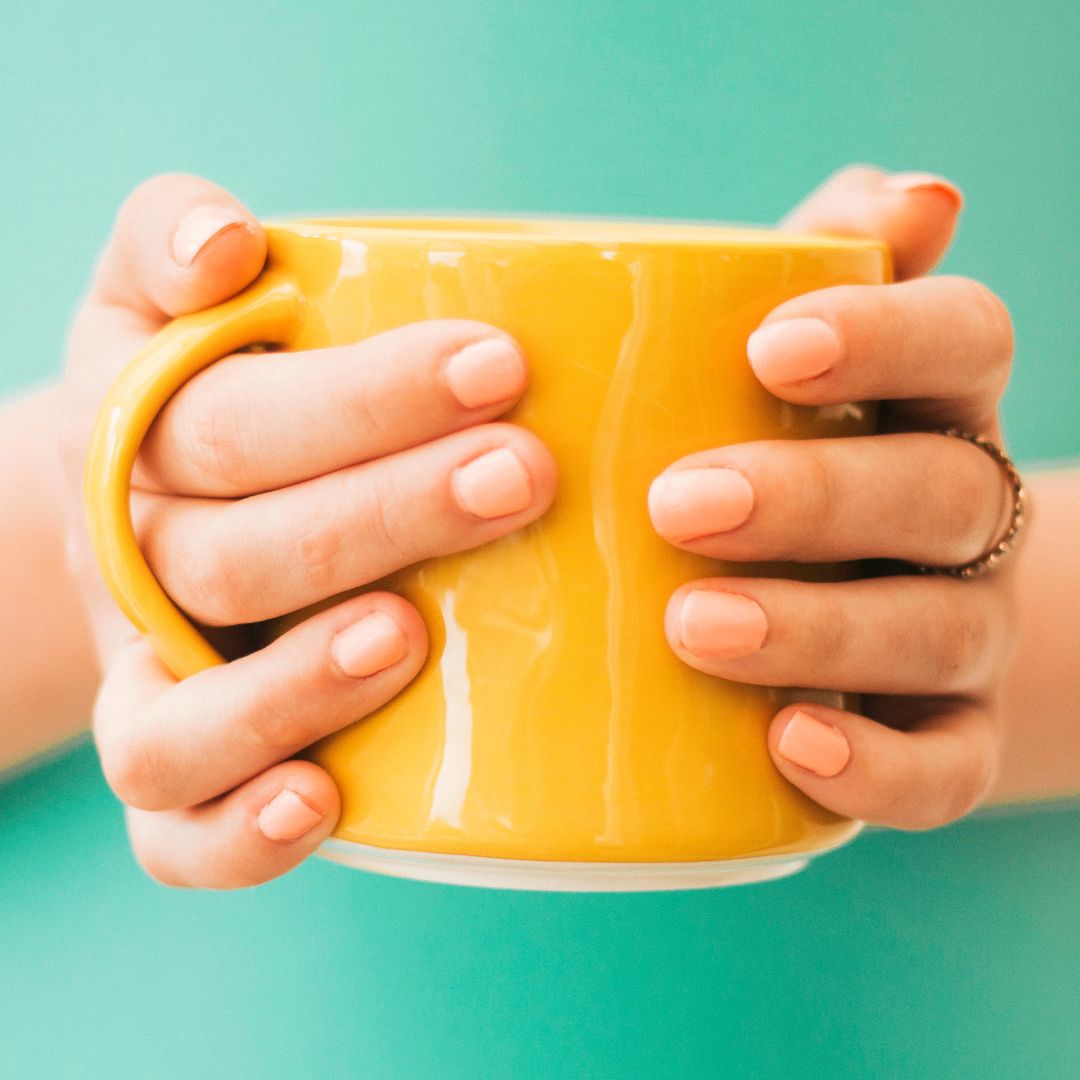In part 2 of this article I discuss:
- How to know if coffee is right for you
- Gentle ways to reduce your consumption, if you choose to
Article originally published at Evolution Botanicals.
So do I give it up completely, just cut back... or keep enjoying my daily bulletproof coffee?
Observe your body during and after you drink coffee. Does your breathing become more rapid, and are you comfortable with that? Do your muscles tense up? How you feel immediately afterwards, a few hours later, and later on in the day? What is your quality of sleep like that night? Do you feel hyper-stimulated, jittery, anxious or overly wired after drinking coffee?
You may drink your daily cup of coffee and experience mental clarity, have no troubles falling asleep and no signs of HPA axis dysfunction, in which case coffee might not be affecting you negatively. Or you may feel sweaty, extremely nervous and unable to fall asleep hours after having just one coffee.
If you’re using it to enhance sports performance, is it actually working for you? Even though caffeine is used by many athletes to lower perceived exertion and increase power output, individual variability should still be considered. Exercise physiologist Stacy Sims reports, “I’ve seen athletes experience big heart-rate and blood pressure swings and become too amped to focus even with low doses (of caffeine).”
INDIVIDUAL VARIABILITY
- Caffeine sensitivity. Genetic factors dictate how well you tolerate caffeine, specifically how quickly your body breaks down caffeine. Your caffeine sensitivity is dependent on the capacity of phase I detoxification in your liver, where it is metabolised by an enzyme encoded in the CYP1A2 gene. You could be a slow or fast metaboliser of caffeine depending on this gene. If drinking a cup of coffee leaves you anxious and jittery, or keeps you awake for days, chances are you are a slow metaboliser. Coffee consumption by slow metabolisers is associated with a higher risk of heart disease (7), high blood pressure (8), and impaired fasting blood glucose (9). If you are curious, you can order genetic testing that will identify you as a slow or fast metaboliser.
- Stress levels and tolerance. When you’re run down and fatigued, caffeine can be harder for your body to handle. A high allostatic load impairs many body functions including liver detoxification and digestion, which may make you more sensitive to caffeine. If you’re healthy and sleeping well you may be able to drink coffee during the day without ill effects. But if you’re not 100% in these departments, coffee could just make things worse.
- Current health status. Do you have PCOS, an oestrogen dominant condition (e.g. endometriosis) or other some other thyroid or sex hormone imbalance? Do you have IBS, fibromyalgia, an autoimmune disease, or another chronic illness that’s really stressing your HPA axis? If so, the stimulating effects of caffeine may be too much for your body to handle and may worsen these conditions.
- Coffee quality. Pesticide-grown coffee beans are one of the most chemically treated crops - an average acre of conventional coffee is sprayed by over 100 kilograms of chemical fertilisers. A daily coffee made with conventionally grown coffee beans, non-dairy creamer and artificial sweetener is probably going to have a greater toll on your health than say an organic coffee with full fat milk or cream.
HOW TO CUT BACK ON CAFFEINE
It’s no secret that the withdrawal symptoms from suddenly quitting coffee can be unpleasant. Headache, fatigue, irritability, anxiety, difficulty concentrating, and flu-like symptoms like nausea, vomiting and muscle pain or stiffness are common when going cold turkey (10, 11). These symptoms usually occur 12 to 24 hours after you completely stop consuming caffeine. They peak in their intensity between one and two days, and all up may last for two to nine days. Of course, the higher your daily caffeine dose, the more unpleasant you can expect the withdrawal symptoms to be. These symptoms may even occur when quitting relatively small doses of coffee, say one small cup of coffee (100mg caffeine) a day (12).
But it’s not all doom and gloom! Instead of going cold turkey, taking a stepwise approach is a more humane way to come down from caffeine without suffering the more severe withdrawal symptoms. You can make the process even more comfortable – and dare I say, even pleasant – by incorporating some nutritive and regenerating caffeine replacements. This gentle approach can eliminate the cravings for your usual coffee fix while beginning to repair any damage caffeine may have done.
How long will this process take? Two to four weeks depending on how much coffee you’ve been drinking. Try reducing the your overall caffeine intake by half. If you’re a 4-cups a day coffee drinker, that might look like:
- going from 4 cups of coffee per day to 2 cups
- swapping 2 regular cups for decaf coffee or green tea instead
- incorporating some non-caffeinated beverages such as herbal tea.
COFFEE ALTERNATIVES
As you work on addressing the life stressors that are bringing about your fatigue, you can simultaneously nourish, support and rebalance your nervous and endocrine systems with tonifying herbs.
Here are some wonderful alternatives to coffee that can not only be used as coffee alternatives, but have veritable health benefits and support natural energy levels without taking a toll on your body:
- Tea (Camillia sinensis): High quality black and green teas contain theanine, a compound, which actually promotes relaxation (13). Theanine has been shown to counteract some of the stimulant effects of caffeine, perhaps one of the reasons that caffeine sensitive people can enjoy tea without the typical caffeine response. Finally, despite still containing some caffeine, it sis much less than coffee; the average cup of coffee contains 135mg of caffeine versus 40mg in a cup of black tea, and 20mg in a cup of green tea.
- Bitters such as roasted dandelion (Taraxacum officinale) root. This herb can help prepare your body for digestion, and stimulates liver detoxification. Chicory root works in a similar way.
- Anxiolytics such as kava (Piper methysticum) and passionflower (Passiflora incarnata) may offer temporary relief for the anxiety that can arise during caffeine withdrawal (14). They are also wonderful ways to help you stay calm and centred in daily life.
- Adaptogens are a special class of herbs that have been used in Ayurveda and Tradition Chinese Medicine for thousands of years, to promote a sense of wellbeing. Adaptogens do just that – they help your body adapt to the ongoing stresses of daily life. They regulate the stress response, increase energy, and most of them are non-stimulating (with the exception of Korean ginseng) (14). Adaptogens work best when they are taken for a minimum of three months. Examples include, but aren’t limited to:
- Ashwaganda (Withania somnifera) – a soothing adaptogen that I use on and off to keep up with the demands of breastfeeding and being a mum of young children.
- Rhodiola (Rhodiola rosea) – an anti-anxiety, immune-boosting adaptogen. Avoid if you have bipolar depression with manic tendencies.
- Shatavari (Asparagus racemosus) – the queen of women’s adaptogens.
- Siberian ginseng (Eleutherococcus senticosus) – a focus and performance enhancer. Avoid with high blood pressure; and if you’re prone to insomnia use a different adaptogen (14).
- Medicinal mushrooms. Adaptogens don’t only come in the herb form; a few mushrooms are also powerful medicinals and adaptogens, such as reishi (Ganoderma lucidum) and chaga (Inonotus obliquus). Dried Reishi mushrooms can be brewed along with cinnamon, cardamom, cloves, peppercorns and nutmeg to make a delicious Reishi chai tea. Chaga tastes very similar to coffee and is enjoyed by people in Russia and Siberia as a daily drink. It was even used as a coffee replacement during World War 2 when food shortages were the norm.
Other ways to smooth out your venture away from coffee include keeping blood sugar levels stable with regular and balanced meals, creating or maintaining a regular mindfulness and meditation practice, enjoyable exercise, staying hydrated, and getting adequate sleep.
The benefits of reducing your coffee intake are huge. Even if you don’t quit entirely, you may find that you need less caffeine than expected to wake up in the morning, and you may start to experience more natural energy and less anxiety. Your thinking can become clearer as your sleep patterns start to regulate. And if you have any of the hormonal conditions described earlier, you can expect improvements in your health the longer your body stays off this potent substance.
Thanks for taking the time to read my blog and enjoy experimenting with some of the ways to support your health and energy levels without dependency on caffeine. If you want more information or to book an appointment with me, you can find me at [email protected].
Wishing you a healthy relationship with caffeine,
Casey
References
- Winston, A., Hardwick, E., & Jaberi, N. (2005). Neuropsychiatric effects of caffeine. Advances in Psychiatric Treatment, 11(6), 432-439. https://doi.org/10.1192/apt.11.6.432
- https://www.sbs.com.au/news/two-million-australians-suffering-anxiety-twice-as-many-as-depression
- Romm, A. (2015). Adrenal Fatigue Syndrome: Integrative Treatment Approach for an Evolving Diagnosis. Alternative and Complementary Therapies. 242-246. http://doi.org/10.1089/act.2015.29028.aro
- Syed, S. A., Kamimori, G. H., Kelly, W., & Eddington, N. D. (2005). Multiple dose pharmacokinetics of caffeine administered in chewing gum to normal healthy volunteers. Biopharmaceutics & drug disposition, 26(9), 403–409. https://doi.org/10.1002/bdd.469
- O'Callaghan, F., Muurlink, O., & Reid, N. (2018). Effects of caffeine on sleep quality and daytime functioning. Risk management and healthcare policy, 11, 263–271. https://doi.org/10.2147/RMHP.S156404
- Kotsopoulos, J., Eliassen, A. H., Missmer, S. A., Hankinson, S. E., & Tworoger, S. S. (2009). Relationship between caffeine intake and plasma sex hormone concentrations in premenopausal and postmenopausal women. Cancer, 115(12), 2765–2774. https://doi.org/10.1002/cncr.24328
- Cornelis, M. C., El-Sohemy, A., Kabagambe, E. K., & Campos, H. (2006). Coffee, CYP1A2 genotype, and risk of myocardial infarction. JAMA, 295(10), 1135–1141. https://doi.org/10.1001/jama.295.10.1135
- Palatini, P., Ceolotto, G., Ragazzo, F., Dorigatti, F., Saladini, F., Papparella, I., Mos, L., Zanata, G., & Santonastaso, M. (2009). CYP1A2 genotype modifies the association between coffee intake and the risk of hypertension. Journal of hypertension, 27(8), 1594–1601. https://doi.org/10.1097/HJH.0b013e32832ba850
- Palatini, P., Benetti, E., Mos, L., Garavelli, G., Mazzer, A., Cozzio, S., Fania, C., & Casiglia, E. (2015). Association of coffee consumption and CYP1A2 polymorphism with risk of impaired fasting glucose in hypertensive patients. European journal of epidemiology, 30(3), 209–217. https://doi.org/10.1007/s10654-015-9990-z
- Evans, S. M., & Griffiths, R. R. (1999). Caffeine withdrawal: a parametric analysis of caffeine dosing conditions. The Journal of pharmacology and experimental therapeutics, 289(1), 285–294. https://jpet.aspetjournals.org/content/289/1/285.full
- Winston, A., Hardwick, E., & Jaberi, N. (2005). Neuropsychiatric effects of caffeine. Advances in Psychiatric Treatment, 11(6), 432-439. https://doi.org/10.1192/apt.11.6.432
- https://www.hopkinsmedicine.org/press_releases/2004/09_29_04.html
- Nobre, A. C., Rao, A., & Owen, G. N. (2008). L-theanine, a natural constituent in tea, and its effect on mental state. Asia Pacific journal of clinical nutrition, 17 Suppl 1, 167–168. https://pubmed.ncbi.nlm.nih.gov/18296328/
- Bone, K (2007), The Ultimate Herbal Compendium,1sted, Phytotherapy Press, Warwick.



































 RSS Feed
RSS Feed



